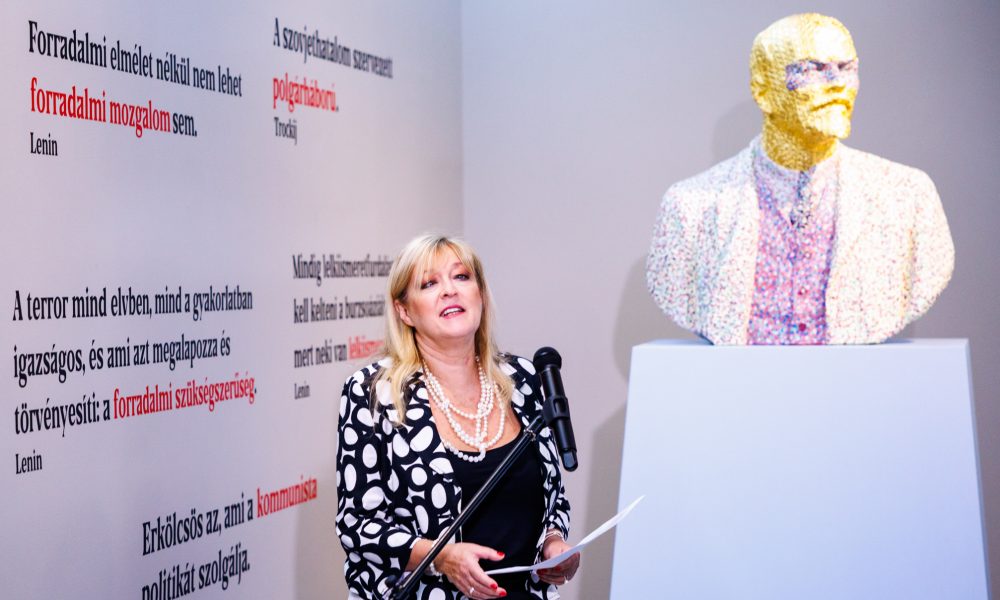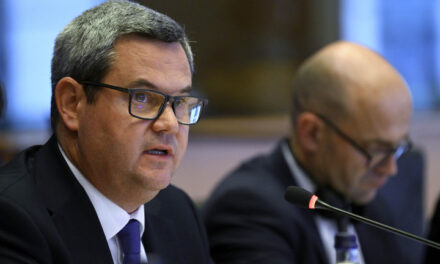We are anti-communists, sovereignists and patriots, that is, we are normal - this is how the history professor Mária Schmidt, director general of the House of Terror Museum, defined the essence of Hungarian national identity.
The freedom fighters were driven by patriotism, they could not bear the lack of freedom that we suffer under the foreign, Soviet rule. It was intolerable for them how our national identity was defamed and our dignity was trampled in the mud - this is how Mária Schmidt summarized what happened in the fall of 1956 in an interview given to the Pesti Srács.
It hurts the ears of the leftists if we compare our struggles today with the mission of the 1956 freedom struggle. Yet how similar are the two? the reporter asked.
"Then and now, we fought for our freedom and sovereignty, because only when we are sovereign can we be free, and when we lose our independence, then our freedom is there too," reminded the Director General.
"We live on the eternal scene of great power clashes. Forces are always pressing down on us, sometimes from the West, sometimes from the East, sometimes from the North, sometimes from the South, to squeeze us into their empires. We have experienced this many times in the course of our history, as in '56 and today," Mária Schmidt pointed out.
Speaking about the freedom fighters of 1956, the director general of the House of Terror Museum said: most of them were young, students, workers. "They undertook the confrontation, the armed struggle and did not give up afterwards. They were driven by patriotism, they could not bear the lack of freedom that we suffer under the foreign, Soviet rule. It was intolerable for them how our national identity was defamed and our dignity trampled in the mud. All of this together gave them such strength that they had the courage to stand up even in the face of obvious superiority. Because they knew and taught us that we can only live a life worthy of a human being if we can live our national identity, if we can say that we are not inferior to anyone else, that we have our own values and want to live according to them. We shouldn't have to slavishly accept what others prescribe - that's what '56 was about, and that's what we're talking about every day."
According to Mária Schmidt, Hungary no longer exists under the grip of a great power as it did in the 1950s.
"After the Second World War, we were clearly classified under the Soviet empire. At the end of the Cold War, we still became free and independent. Of course, there are still imperial aspirations, because the unipolar world, which allowed us to live freely, is now facing huge challenges", he pointed out, and then explained: a new order is taking shape, it creates turbulence, but we hope that the change will not lead to general war.
"For now, it is difficult to say what defense mechanisms the great powers will develop and who will win this fight, but let's hope they choose compromise instead of destruction. That would be great luck for us and the whole world. The unipolar world that emerged after the fall of the Soviet empire provided security and a framework for us for decades, but this period is over. The reorganization has already spawned a war along our borders and in Israel, and it is possible that an even bigger conflict could come."
According to the head of the House of Terror Museum, being a hero is not good. "There are times when we have to, but let's not strive for it! Man was not born to be a hero, but to enjoy life and live everyday, preferably in a family circle, happily and contentedly. You have to be a hero when there is no other option."
According to Mária Schmidt, everyone can also be a "hero" in their own field, so that they make the most of themselves, because everyone is needed.
"Indeed, very large forces are interested in us not being, and these forces do not stop working for this goal. Hungarians have a special nature, we don't like being told where we belong and how we should behave. Therefore, our habitus visibly irritates the decision-makers committed to the imperial idea".
People must first of all organize from below the circles within which they can fulfill themselves and continue their discussions, emphasized the director general, who also justified his statement.
"People live their lives locally, they feel at home in local communities. You shouldn't expect everything from the center and the state! Let's say that we will fix this playground, clean this street, and so on! When these common good things come together, small communities are forged. You can rely on this sense of community," emphasized Mária Schmidt.
"We are now at a point where we can easily make fun of the communists. In our new temporary exhibition at the House of Terror Museum, we literally covered the Lenin statues with lace, symbolizing this feeling. We covered the mouth of one, the ears of the other, and the eyes of the third to express that today we can laugh at them, we are over those horrible figures who were completely deaf to reality," the general director touched on the museum's new exhibition, adding : we managed to defeat Lenin, the Westerners have not yet.
The Director General sees it this way: we could not sufficiently explain to those living in the welfare world what the existing communism meant in the Soviet Union for more than seventy years, but also for almost fifty years in our country.
"Of course, this is not only our fault, as Western people suffer from a lack of ideas and thoughts. That's why they tend to go back to something they don't know about, they don't want to know anything about. They don't ask about our experiences, because they know this, as well as everything else, better than us. Let's not forget that the Western intellectuals were Maoist and Trotskyist in the 1960s and 1970s, but then they just went to Wall Street to make money. The generations that came after them no longer had to make money, they remained "revolutionaries". Apparently, not only wealth, but also stupidity is inherited from father to son".
Speaking about the current events, Mária Schmidt also speculated on the possible outcome of the Russian-Ukrainian war:
"I think the Russian-Ukrainian war can end in three ways: either the American-Ukrainian coalition wins, which would have very serious consequences for the Russians and, through this, for the entire world politics, because the Global South would be forced to take action. However, there is little chance of this. I see it more likely that the Russians will win, by which I mean that they will be able to keep the territories they have taken so far, and maybe a little more. Russia simply cannot afford to lose the war. The consequences of this are yet to be seen, but it is certain that Europe and NATO would also suffer greatly from the fall. Of course, the USA is much less. There is also a chance that the fighting would break off without a ceasefire and a stalemate would develop, like the one between the two Koreas. This is also very bad, because there would be even less chance than now to return to the old, normal life and trade".
Mária Schmidt sees it as follows: the fact that the world's attention is increasingly diverted from the war in Ukraine with the brutal wave of terror against Israel and the renewal of the fighting also means that the possibility of NATO escalating into war is becoming less and less, which with Russia, which has a significant nuclear arsenal on the contrary, it would be the worst scenario for the world.
By the way, NATO was already very weakened in this war, it gave almost its entire arsenal to Ukraine, and it has now been destroyed there.
"The enormous blood loss that Europe is suffering in this war is very painful," Mária Schmidt pointed out.













